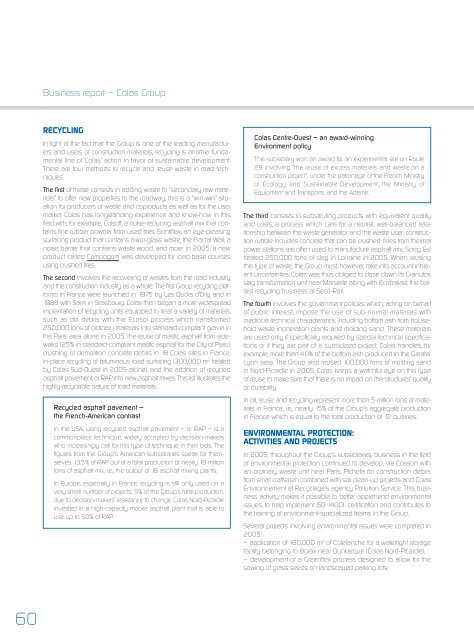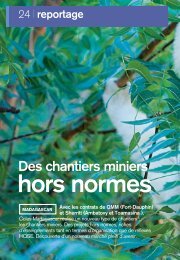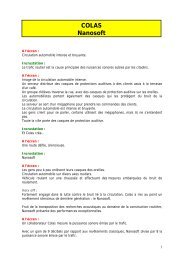Colas RA
Colas RA
Colas RA
Create successful ePaper yourself
Turn your PDF publications into a flip-book with our unique Google optimized e-Paper software.
60<br />
Business report – <strong>Colas</strong> Group<br />
RECYCLING<br />
In light of the fact that the Group is one of the leading manufacturers<br />
and users of construction materials, recycling is another fundamental<br />
line of <strong>Colas</strong>’ action in favor of sustainable development.<br />
There are four methods to recycle and reuse waste in road techniques.<br />
The first of these consists in adding waste to “secondary raw materials”<br />
to offer new properties to the roadway: this is a “win-win” situation<br />
for producers of waste and coproducts as well as for the user<br />
market. <strong>Colas</strong> has longstanding experience and know-how in this<br />
field with, for example, Colsoft, a noise-reducing asphalt mix that contains<br />
fine rubber powder from used tires, Scintiflex, an eye-pleasing<br />
surfacing product that contains mirror-glass waste, the Fractal Wall, a<br />
noise barrier that contains waste wood, and more. In 2005, a new<br />
product called Compogom was developed for road base courses<br />
using crushed tires.<br />
The second involves the recovering of wastes from the road industry<br />
and the construction industry as a whole. The first Group recycling platforms<br />
in France were launched in 1975 by Les Docks d’Orly and in<br />
1988 with Sarm in Strasbourg. <strong>Colas</strong> then began a more widespread<br />
implantation of recycling units equipped to treat a variety of materials,<br />
such as dirt debris with the Ecosol process which transformed<br />
250,000 tons of ordinary materials into standard-compliant gravel in<br />
the Paris area alone in 2005, the reuse of mastic asphalt from sidewalks<br />
(25% in standard-compliant mastic asphalt for the City of Paris),<br />
crushing of demolition concrete debris in 18 <strong>Colas</strong> sites in France,<br />
in-place recycling of bituminous road surfacing (300,000 m 2 treated<br />
by <strong>Colas</strong> Sud-Ouest in 2005 alone), and the addition of recycled<br />
asphalt pavement, or <strong>RA</strong>P, into new asphalt mixes. This list illustrates the<br />
highly-recyclable nature of road materials.<br />
Recycled asphalt pavement –<br />
the French-American contrast<br />
In the USA, using recycled asphalt pavement – or <strong>RA</strong>P – is a<br />
commonplace technique, widely accepted by decision-makers<br />
who increasingly call for this type of technique in their bids. The<br />
figures from the Group’s American subsidiaries speak for themselves:<br />
13.5% of <strong>RA</strong>P out of a total production of nearly 18 million<br />
tons of asphalt mix, i.e., the output of 18 asphalt mixing plants.<br />
In Europe, especially in France, recycling is still only used on a<br />
very small number of projects, 5% of the Group’s total production,<br />
due to decision-makers’ resistance to change. <strong>Colas</strong> Nord-Picardie<br />
invested in a high-capacity mobile asphalt plant that is able to<br />
use up to 50% of <strong>RA</strong>P.<br />
<strong>Colas</strong> Centre-Ouest – an award-winning<br />
Environment policy<br />
This subsidiary won an award for an experimental site on Route<br />
28 involving “the reuse of excess materials and waste on a<br />
construction project”, under the patronage of the French Ministry<br />
of Ecology and Sustainable Development, the Ministry of<br />
Equipment and Transports, and the Ademe.<br />
The third consists in substituting products with equivalent quality<br />
and costs, a process which calls for a neutral, well-balanced relationship<br />
between the waste generator and the waste user: construction<br />
rubble includes concrete that can be crushed; fines from thermal<br />
power stations are often used to manufacture asphalt mix; Screg Est<br />
treated 250,000 tons of slag in Lorraine in 2005. When reusing<br />
this type of waste, the Group must, however, take into account inherent<br />
uncertainties. <strong>Colas</strong> was thus obliged to close down its Granufos<br />
slag transformation unit near Marseille along with Écoballast, the ballast<br />
recycling business at Seco-Rail.<br />
The fourth involves the government policies which, acting on behalf<br />
of public interest, impose the use of sub-normal materials with<br />
mediocre technical characteristics, including bottom ash from household<br />
waste incineration plants and molding sand. These materials<br />
are used only if specifically required by special technical specifications<br />
or if they are part of a subsidized project. <strong>Colas</strong> handles, for<br />
example, more than 40% of the bottom ash produced in the Greater<br />
Lyon area. The Group also reused 100,000 tons of molding sand<br />
in Nord-Picardie in 2005. <strong>Colas</strong> keeps a watchful eye on this type<br />
of reuse to make sure that there is no impact on the structures’ quality<br />
or durability.<br />
In all, reuse and recycling represent more than 5 million tons of materials<br />
in France, i.e., nearly 15% of the Group’s aggregate production<br />
in France which is equal to the total production of 12 quarries.<br />
ENVIRONMENTAL PROTECTION:<br />
ACTIVITIES AND PROJECTS<br />
In 2005, throughout the Group’s subsidiaries, business in the field<br />
of environmental protection continued to develop, via Cosson with<br />
an ordinary waste unit near Paris, Picheta for construction debris<br />
from small craftsmen combined with soil clean-up projects and <strong>Colas</strong><br />
Environnement et Recyclage’s agency Pollution Service. This business<br />
activity makes it possible to better apprehend environmental<br />
issues, to help implement ISO 14001 certification and contributes to<br />
the training of environment-specialized teams in the Group.<br />
Several projects involving environmental issues were completed in<br />
2005:<br />
– application of 160,000 m 2 of Coletanche for a watertight storage<br />
facility belonging to Borax near Dunkerque (<strong>Colas</strong> Nord-Picardie);<br />
– development of a Greenflex process designed to allow for the<br />
sowing of grass seeds on landscaped parking lots;





